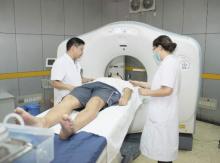After adjusting for variables, patients with iodinated contrast media (ICM) exposure had a significantly higher risk of thyroid dysfunction (hazard ratio, 1.46; 95% confidence interval, 1.29-1.66), compared with that of patients in the non-ICM exposure group, wrote the authors of a newly published study in the Journal of Clinical Endocrinology & Metabolism.
Lead author Dr. Edy Kornelius and associates examined 19,642 cases and 78,568 matched controls, recruited from the general population in Taiwan, in a 6-year cohort study. A total of 383 ICM-exposed patients had thyroid dysfunction (cumulative risk: 1.9%), compared with 1,252 patients without ICM exposure (cumulative risk: 1.5%). The number needed to harm (NNH) was 1 for every 250 people, the investigators noted.
In the subgroup analysis, the adjusted hazard ratios of hyperthyroidism and hypothyroidism were 1.22 (95% CI, 1.04-1.44) and 2.00 (95% CI, 1.65-2.44) when compared with controls. Patients with a higher Charlson’s Comorbidity Index were generally at a higher risk of thyroid dysfunction.
“In this study, we found a 22% increased risk of hyperthyroidism in ICM-exposed patients,” the authors wrote. “Although ICM-related imaging and interventional studies improve the disease diagnosis rate and quality of health, physicians should be aware of the complications of ICM and should apply it cautiously in clinical practice.”
For the full article, click here: J. Clin. Endocrinol. Metab. 2015 (doi:10.1210/JC.2015-2329).


